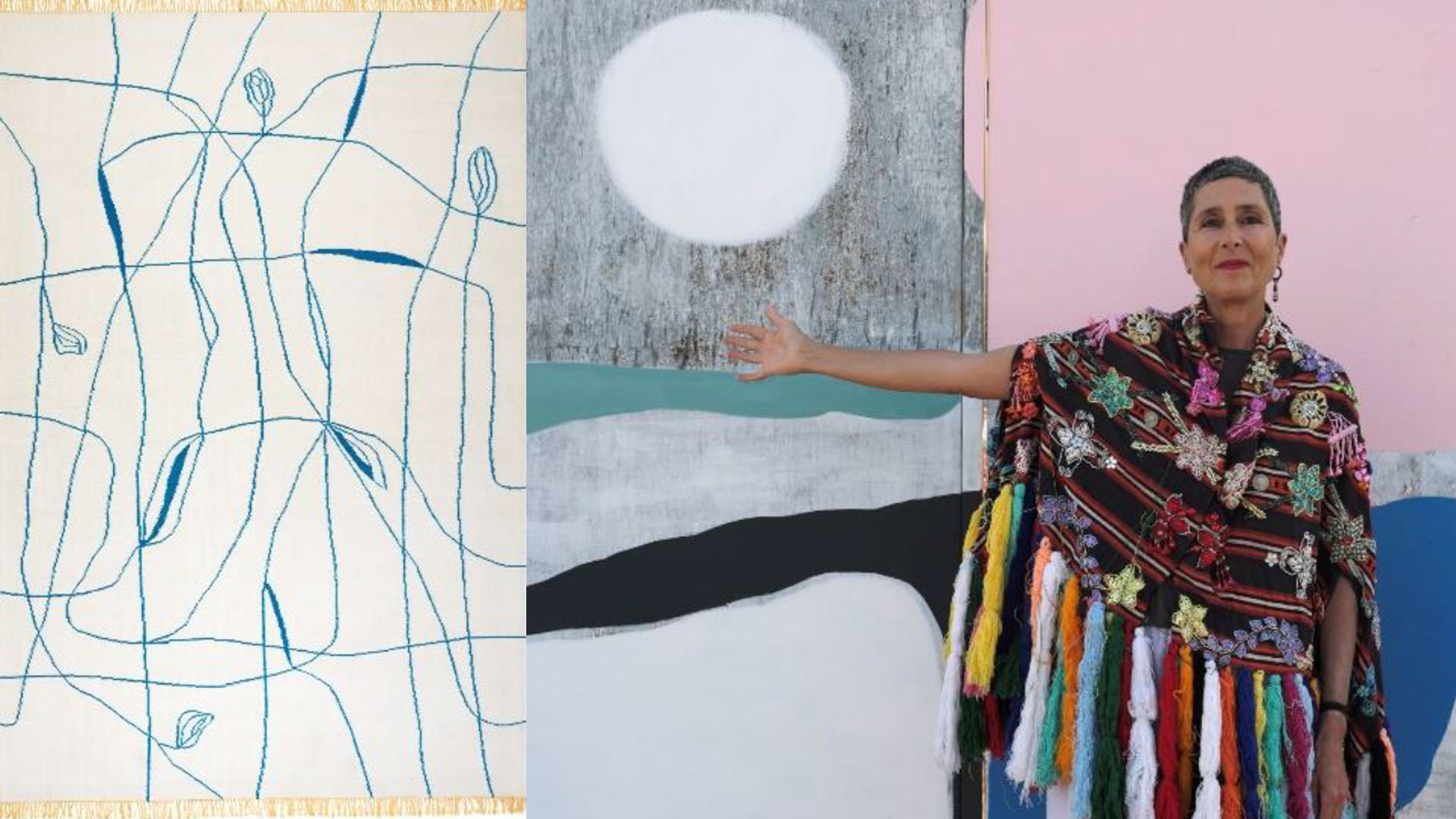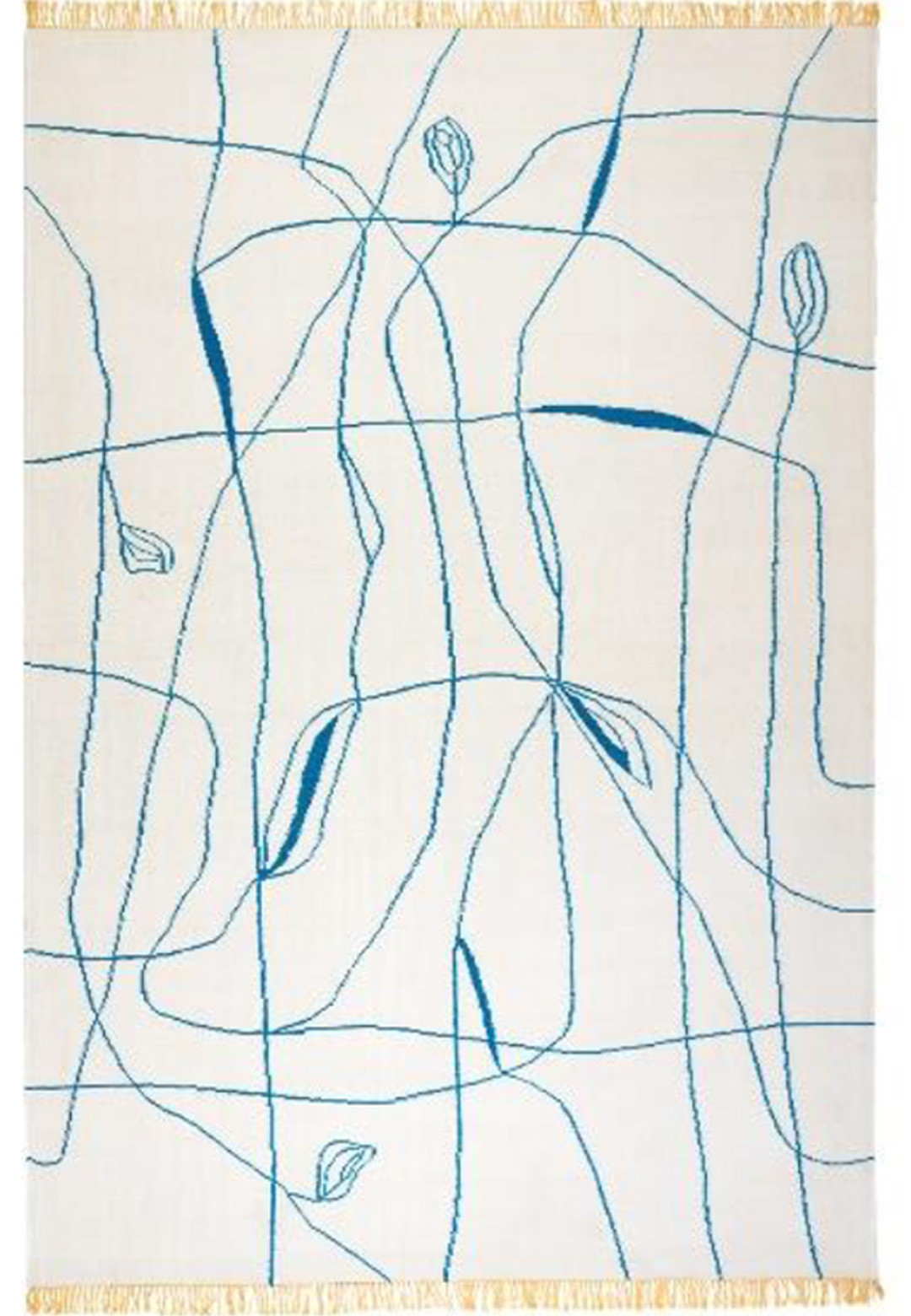Thoughtfully selected furniture design, accentuated lighting design, striking wallpapers, inviting surface finishes and intricate upholstery: numerous elements collude to create your dream abode. But even in a space populated with the forenamed ingredients, something is clearly missing. Add a humble rug and the entire milieu transforms. In a room without a rug, a lingering void incessantly pesters the eye—a vexation comparable to what one feels when macaroni is without cheese, or peanut butter without jelly. A rug design has the innate capability to bind all the divergent components of a space together, and define the scheme of the interior design. Whether you want to add texture to an interior, contrast (or complement) the minimalism, or even revamp your space with the bare minimum efforts, a rug is the answer. But how often do we really look at a rug and probe what the details hide? What narratives silently lie under the rug?
Interior designer and artist Elena Barenghi approaches fashion, art and design through the lens of her poetry. Living between New York and Noto, Barenghi presents Ravie, a collection of 10 dhurrie rugs for Milan-based brand NODUS. The handcrafted rugs are created in ethically certified manufacturing centres, using pure wool and the kilim flat pile knotting technique. The Ravie capsule collection partakes in Enjoy, the "easiest" of the NODUS collection that offers carpets made in specific colours and in predetermined sizes. To articulate the thoughts behind her creations for NODUS, Barenghi resorts to her beloved medium, poetry:
“The name I called my rugs collection with
Is a remembrance of my childhood
Ravie is its name
Which in French means happy, more than happy.”
Born in Switzerland, the artist has been a wanderer by nature since her early days, her poetry leading her into song, fashion, art and design. In Milan she worked in fashion design and became a model. In Rome, she continued writing poems and began her artistic career that evolved through painting, photography and drawing. In Florence, she attended the Istituto Spinelli per l’ Arte e il Restauro where she honed her artistic skills, then flying to New York to study literature—later publishing a book of poems in English, French and Italian. In Europe, she released an album entitled Giorì with Amiata Records, her song ‘Vèrs l’Est’ and the video of her single garnering attention worldwide. On embracing motherhood, she leaves Italy for Brussels where she opens a concept store, a Bed and Breakfast while working as an interior decorator. She currently lives between New York, where her journey as an interior designer continues to unfold, and Noto, where she completed a mural inspired by the history of the Sicilian city.
Her first rendezvous with creating carpets was when she partnered with IL Piccolo Design and contrived a series of handmade carpets employing the traditional Kilim technique. Adding a new milestone to her long list of adventures, Barenghi unveils the series titled ‘Ravie,’ an ensemble rooted in her homeland, her childhood, and the ecstasy of moments she spent in nature. From the creative genius of artist and designer, the hand-knotted wool rugs are impassioned by the reminiscence of the world of nature, bringing the viewer face-to-face with its regenerative power. The artefacts belonging to the dhurrie carpet family, are made by the hands of expert knitters in India. "This project started after a month stay in an oasis in the Egyptian desert where women make carpets, all hand made and in wool Kilim style. During my stay, I asked a woman to make a sample carpet following one of my drawings, I loved the result and wanted to continue further," the designer shares.
Each rug constituting the collection speaks of the sheer love of nature, akin to a lot of Barenghi’s poems. "Nature is at the center of all my work, it is my main teacher. While conceiving an artwork, its colours, shapes and harmony guide me," she says. One pays a homage to joy and serenity while the contemporary design of the other embraces the ancient craftsmanship. Gentle lines run into, across and away, chasing each other in geometric patterns evocative of leaves, flowers and stems. The memory of nature’s embrace as one spent carefree moments surrounded by it as a child forms a common theme that inspired the artist’s rug designs. Thin lines compose, with extreme delicacy, and scenic impact, designs representing various elements of the natural world, and the sincere emotion they induced—a poetry of thin threads. The stylised delineating patterns in fine blue threads are contrasted by the red, orange and yellow fringes that trace the rugs’ peripheries. "I made ten drawings expressly for the project. Then for each drawing I chose a colour that would make the fringes," Barenghi explains. "After a few months the first sample came to life and Nodus decided to proceed with the rest; Ravie was born," she adds.
Translating her designs into poetry, Barenghi writes:
“Behind the lines forming flowers
Forming signs
There are thoughts
Are the colours of the sky
Are the colours of the sea
And then
There is my love for nature…”
The woollen artefacts that the artist conceived for the Italian brand are a tribute to nature—using her creative flair to teleport the onlooker to a timeless dimension where the childlike enchantment with nature lives on. The minimal and refined dhurrie carpets of unequivocal value and with a strong artistic connotation, enunciate the protagonist. As the sketches communicate a time and emotion we are now unbeknownst to, the unwritten poetry reminds us what we forgot—the soft grass under our feet, the wafting scents of flowers and the overpowering sense of peace that ensues—and perhaps what we unknowingly wish to return to.






 Sign in with email
Sign in with email










What do you think?